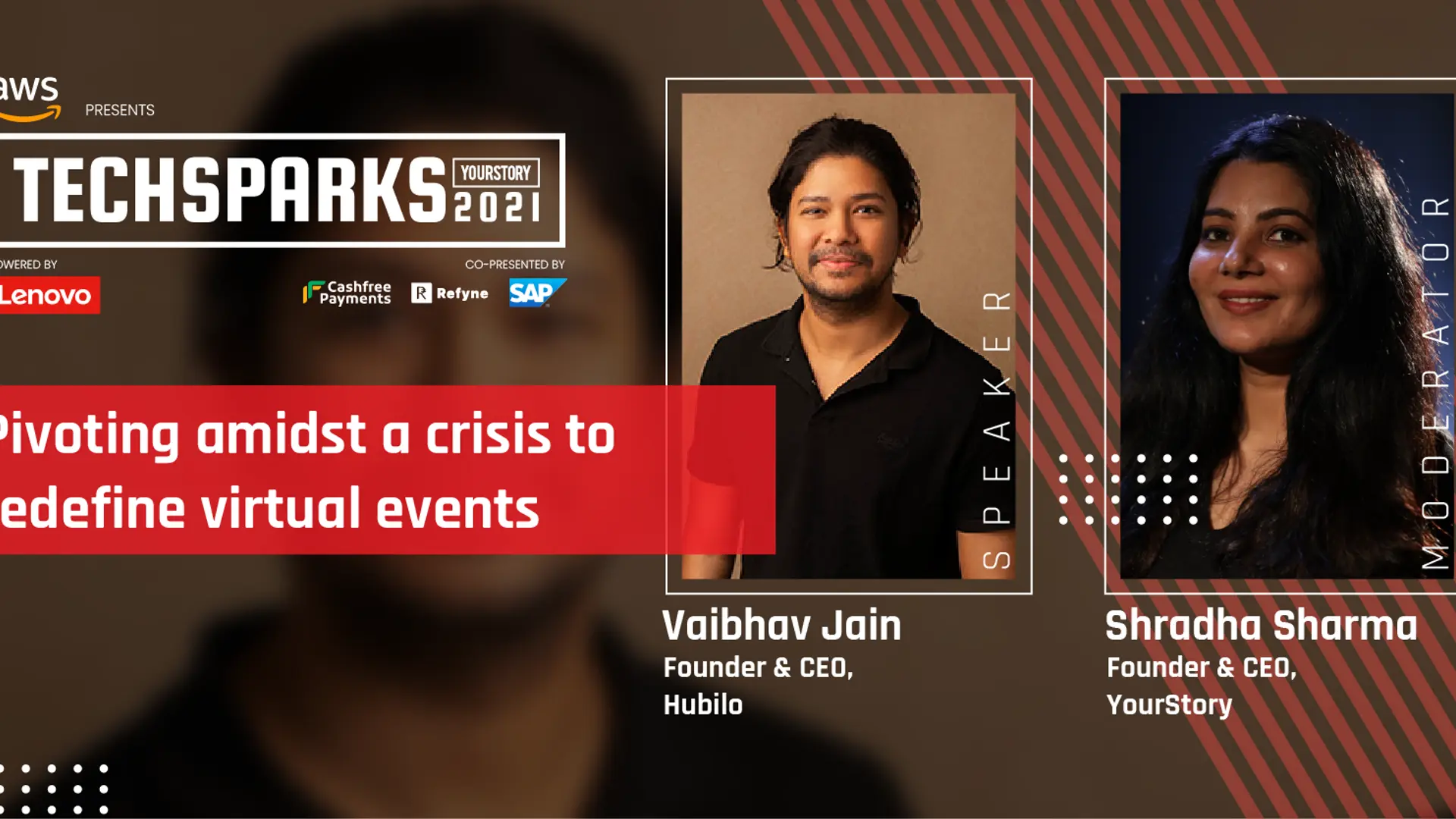Inside Hubilo’s pivot and sprint to becoming a virtual event platform
Hubilo’s quick pivot and accelerated product roadmap helped it move from a company on the verge of a shutdown to a success story, says CEO and Founder Vaibhav Jain.
Lightning speed of execution and quick pivot to stay relevant in changing times has seen virtual and hybrid events platform make it to the other side of the pandemic. The company, which started in 2015 and built a SaaS platform for offline events, adapted and reimagined itself to become a virtual event platform in February 2020, said Vaibhav Jain, Founder and CEO at Hubilo.
Speaking to Shradha Sharma, CEO and Founder of YourStory Media, at TechSparks 2021, Vaibhav said that the company had a runway of five months and he was mulling shutting it down before the pandemic hit.
“All of us took a pay cut of 40 percent to stretch our runway by two months and to give us seven months of experimentation. If we crossed the chasm, we knew we would be able to get the revenue we wanted and attract investors,” he said.
In October 2021, Hubilo raised $125 million led by the US-based Alkeon Capital in a Series B round of funding, which also saw participation from Lightspeed Venture Partners and Balderton Capital.
What worked in the Ahmedabad-born company’s favour was the prescience to pursue the virtual events space and moving fast.
Moving fast, breaking things
As events got cancelled as a result of the pandemic, Hubilo’s business decimated in early 2020. This is when the core team decided to build products and features to tap into the virtual events space.
Instead of building a new product from scratch, Hubilo decided to repackage its offering for the online events space.
“In less than 26 days, we repackaged one of our existing solutions and launched that. We did our first event for $250. We also reduced our sprint cycle from ideation to releasing a product in the market from a period of four weeks to one week,” said Vaibhav.
The team also ensured that they attended the virtual events being held on the platform to pick up glitches and feedback from attendees and customers to improve the product on the go. The company’s history serving the events industry helped it chalk out what each stakeholder wanted.

With the initial success and fierce competition from incumbents in the space, Hubilo is building out key differentiation in its platform. Its product roadmap includes building opportunities for engagement with the content generated by events on the platform. The team is also working on developing a branding kit for organisers who can reimagine their virtual space.
“We are also looking to help event planners by creating a marketplace of speakers, sponsors, venues, and different vendors all over the world,” said Vaibhav.
His team is also working on monetising the learnings from a video by turning it into a blog or ebook which add to the lifecycle post-event.
The future is hybrid
While pandemic pushed scheduled events to go online, virtual events will continue to command a significant market share going ahead, said Vaibhav. Event managers too are keeping pace to cater to a mixed bag.
“People will do physical events when the experience is critical. Rest of the content strategy will move to virtual events,” said Vaibhav.
He added that out of 10 events a company does every year, two will be physical, two will be hybrid, and the rest will go virtual, which will not have a predecessor in the offline world. The virtual events have also moved on from a one-to-many kind of webinar format to a many-to-many format.
The uptake across sectors adds steam to this hypothesis. Hubilo’s platform is being used by its enterprise customers to onboard employees seamlessly on a branded virtual platform. Some of the enterprise customers are also using the platform for learning and development, as well as running a virtual office.
On the customer front, education, especially distance learning has been a quick adapter.
With these tailwinds, Hubilo plans on expanding its presence across geographies, driving sales and building a unified company culture. While the last 18 months were all about creating the product, the next 18 months will be about product differentiation.
“Nearly 12 percent of our revenues come from India, which is a very good number compared to other SaaS companies,” said Vaibhav. He wants Hubilo to turn into the best-selling SaaS product from India going ahead.
To log in to our virtual events platform and experience TechSparks 2021 with thousands of other startup-tech enthusiasts from around the world, join here. Don't forget to tag #TechSparks2021 when you share your experience, learnings and favourite moments from TechSparks 2021.
For a line-up of all the action-packed sessions at YourStory's flagship startup-tech conference, check out TechSparks 2021 website.

Edited by Saheli Sen Gupta




